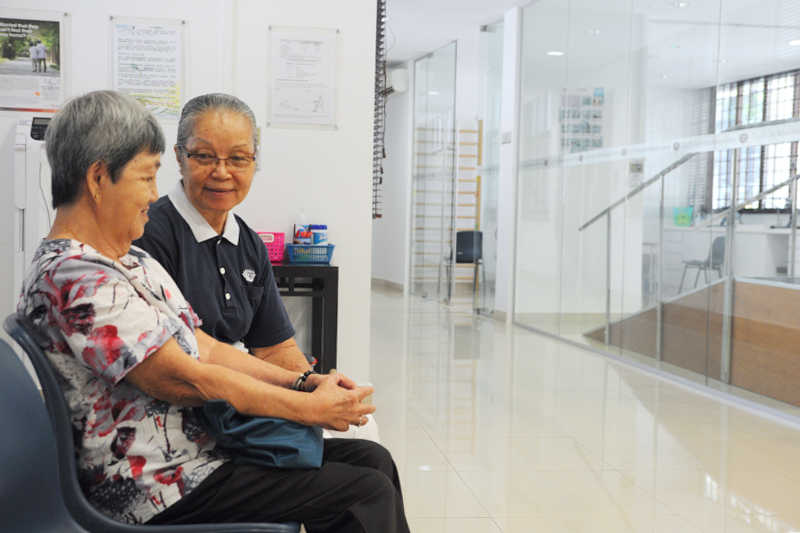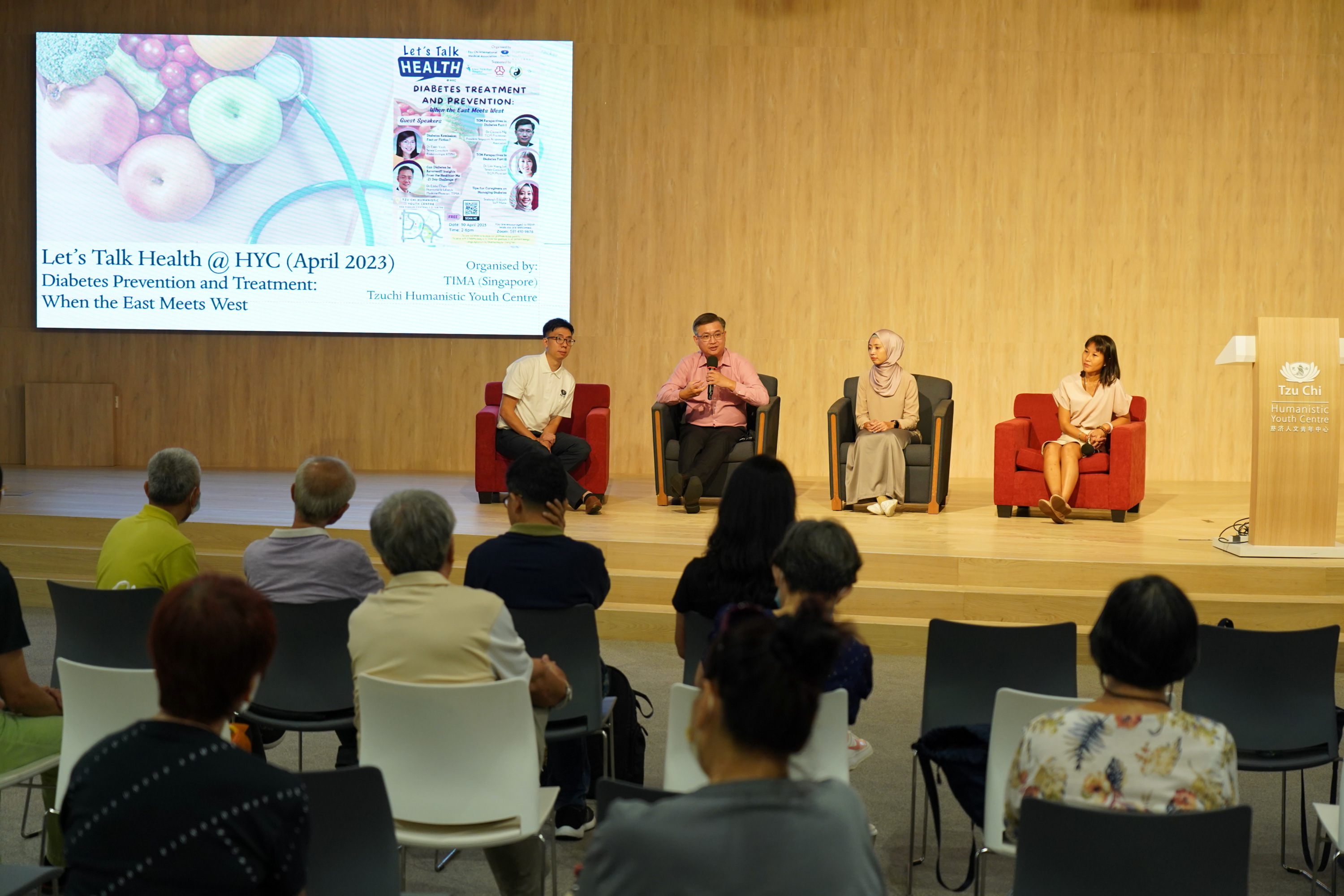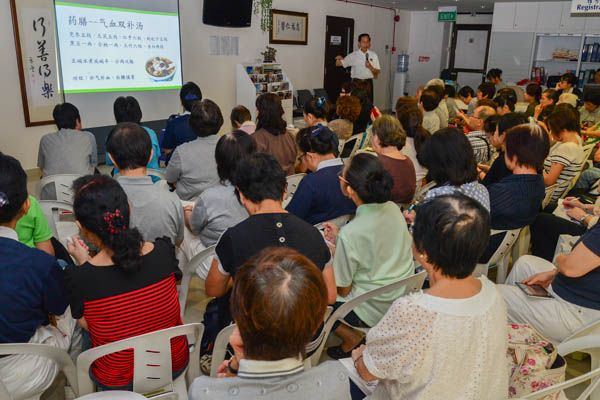On June 13th 2015, the Tzu Chi Foundation (Singapore) and the National Organ Transplant Unit (NOTU) organized the “Knowledge and Awareness of Organ and Body Donation” medical forum attended by 75 participants. (Photo by Pua Poo Toong)
Death is an inevitable part of life, one which all mortals have to face one day. Every man dies; not every man really lives. As Master Cheng Yen taught, “One does not have a claim on one's life, but only the right to use it,” thus it behooves us to ponder how we can maximize our life in meaningful ways
On 13th June, 2015, the Tzu Chi Foundation (Singapore) and the National Organ Transplant Unit (NOTU) jointly organized a medical forum on the theme of “Knowledge and Awareness of Organ and Body Donation”. Hosted at the Tzu Chi Free Clinic, the forum saw about 75 participants in attendance.
Coordinators from NOTU Benjamin Ho and Toh Xin Yi, together with Associate Professor Ng Yee Kong from the Department of Anatomy, Yong Loo Lin School of Medicine, National University of Singapore (NUS), spoke at length about the current state of organ and body donation in Singapore, relevant legislation and requirements, as well as the groundbreaking transformation of the concept of body donation after the integration of humanistic aspects in the donation process.
Donation Aided By Knowledge
“I have definitely heard about organ and body donation, but the concept still remains nebulous to me. Thus I decided to attend this forum to find out more”, remarked participant Lin Min Qiang. He was seen browsing through information leaflets about organ donation and engaging in discussion with participants seated around him. The topic of organ/body donation hardly features in daily conversation, especially since death remains a taboo topic of discussion in Singapore’s relatively conservative society. Like Lin, most participants attended this forum in hopes of learning more and clarifying their doubts about the concept of organ/body donation.
The donation of organs and bodies is not equivalent to the donation of material goods or monetary wealth, and we should respect life, both as a nation and as an individual. Behind this act of Great Love, there lies great sacrifice. Hence, organ and body donation should necessarily comply with relevant laws and regulations, and respect both the individual’s and family’s wishes.
NOTU coordinator Benjamin Ho began by sharing about the current situation of organ and body donation in Singapore, emphasizing the discrepancy between the supply and demand of donated organs/bodies faced locally. He also explained in detail the legislation and guidelines pertaining to organ/body donation stipulated in the Human Organ Transplant Act (HOTA), and the Medical (Therapy, Education and Research) Act (MTERA), allowing the audience to understand more from the legal perspective.
“As everyone can see, the number of body donations in 2007 was zero, and this number started growing in 2012 to reach fourteen in 2014. The growth in numbers notwithstanding, demand far outstrips supply given the large numbers required for medical education and research today.” Ho added that the publicity given to the topic of organ donation in the mass media has greatly aided in the push for more organ and body donations.
He also emphasized that in order to protect the safety of healthcare workers and medical students, bodies of the deceased harboring infectious diseases including tuberculosis, human immunodeficiency virus (HIV), and pneumonia, are not suitable to be donated as cadavers for the purposes of medical education and research. At the same time, he spoke about the process of body donation in detail, including the means of confirmation of death in potential donors, establishing contact with NOTU coordinators, as well as arranging family conferences, thus clarifying all doubts and preconceived notions that the audience may have had.
Donations That Extend Beyond Physical Death
”In 2014, there were 474 cases nationwide on the transplant waiting list, with 353 patients requiring kidney transplants, 60 requiring liver transplants, 38 requiring corneal transplants, and 23 requiring heart transplants. Amongst these patients, there are individuals who had to wait for 20 years before a suitable kidney could be transplanted.” NOTU coordinator Toh highlighted these astonishing statistics to the audience at the start of the talk to set the context for the day, before going on to categorically explain the management of physical and mental conditions, as well as economic ramifications which organ recipients will face in the post-transplant period.
For example, renal failure and coronary artery disease are among the common complications of uncontrolled diabetes and hypertension. If a patient with renal failure fails to find a suitable donor kidney for transplantation, he must necessarily undergo dialysis to sustain his physiological bodily functions, and this long-drawn sequelae of renal failure will bring about negative psychosocial and economic impacts on the patient’s family. However, should a kidney transplant be successful, patients will not only enjoy longevity benefits and improvements in their quality of life, but also save on a large proportion of money and time which will otherwise be spent in managing their disease.
Following which, Toh Xin Yi gave examples of organ donation by three individuals—a Singaporean who had lost his life in a road traffic accident, a foreigner who was declared brain-dead after suffering from hypoxia while mountain-climbing, as well as the youngest organ donor in Singapore who had not reached two years of age; because of their selfless donations, the lives of up to 50 patients were saved. These cases exemplify the fact that an individual’s selfless donation can not only save another individual’s life, but positively impact the lives of many patients.
“Indeed, the act of organ donation does not signify the end of the life of the donor, but celebrates the continuity of life in others whom this precious gift of a new lease of life was bestowed upon.” These closing remarks left the audience in silence, the meaning behind the words reverberating in their hearts.
Humanistic Care for the Departed
“Brothers and sisters, my Mandarin is not very good, so I seek your understanding as I make my speech in a mix of English and Mandarin,” Professor Ng Yee Kong said humorously, in a bid to dispel the veil of grave silence that had descended upon the audience.
It turned out that Professor Ng had originally planned to travel to Myanmar on a business trip that day, but having received the invitation to be a guest speaker, alongside the fact that he was competent in delivering a speech in Mandarin which other colleagues were unable to, he canceled all plans in order to share with the audience about the history of organ and body donation in Singapore, as well as the transformation of the concept of body donation after the integration of Tzu Chi’s humanistic philosophies into the donation process.
In the 1980s, the supply of cadavers for the purposes of medical education came largely from unclaimed bodies, which were sufficient to meet the demands of medical education and research at that time. However, given the swift advances in medicine and societal progress with time, the number of unclaimed bodies drastically decreased. Juxtaposed with a significant increase in the need of cadavers for teaching purposes, this phenomenon unfortunately led to the teaching of anatomy being limited to theoretical means, with no opportunities for students to engage in hands-on learning. This supply-demand mismatch was further aggravated by Singaporeans’ largely traditional and conservative mindsets, and the paucity of information about organ donation, which led to misconceptions amongst Singaporeans.
In 2008, Professor Ng had the opportunity to attend the TIMA (Tzu Chi International Medical Association) Conference organized in Taiwan, and was deeply moved by the respect and gratitude encompassed within Tzu Chi’s humanistic philosophies. This was exemplified by medical students who attended Tzu Chi University’s medical school’s “Silent Mentor Program”. It was then that he resolved to introduce and integrate these humanistic ideas into Singapore’s medical scene, especially by bringing the best practices of body donation and the Silent Mentor Program back to positively influence medical education in Singapore.
“Before changing others, one must first endeavor to change oneself.” Professor Ng upholds this belief, living by the five principles of “Raising Awareness”, “Increasing Transparency”, “Strengthening Recognition”, “Showing Respect and Responsibility”, and “Learning to Give Gratitude”. After many years of sheer hard work as well as improvements in the facilities and resources, the Anatomy Hall in NUS underwent a massive transformation.
Moreover, through Professor Ng’s relentless persuasion and outreach to his network of contacts, he managed to fight for every cadaveric donor to be honored in a sincere gratitude ceremony, before being cremated in a dignified manner. As he put it, “If the cadaveric donor’s family does not attend the ceremony, we will be his family; his act of donating his body to us immediately makes us his family”. Indeed, this is the most basic form of respect, and demonstrates the brilliance of humanity.
A Vow Inspired by Great Love
Lin Min Qiang, who intends to donate his body to medical education and research, had many takeaways from the sharing by the distinguished line-up of speakers. He said, “Prof Ng’s speech allowed me to gain a deeper understanding of the transformation and progress in the ethos and processes of body donation in Singapore, and seeing how cadavers are treated with more respect, I am more confident in my resolve to donate my body”.
Another participant, the elderly Dai Jin Lian, was seen filling up the form for body donation enthusiastically at the conclusion of the forum. She shared, “Previously, my friends and family dissuaded me from donating my organs or body because my organs are not suitable for donation as I am so old, and hospitals would not want my organs.”
Indeed, it might not be wise to follow the misguided advice of others. Dai, who had previously undergone a colorectal surgery and experienced a near-death situation, nevertheless remains optimistic and maintains her upbeat outlook on life. Currently, she is still attending English classes and swimming regularly to keep fit, as she believes in the ephemerality of life and that she should thus live life fully.
Dai had once collected the body donation form, but she was unable to understand its contents, which was in English. Furthermore, she was unable to obtain agreement from her children. This time, after fully understanding the details of body donation through this forum and under the guidance of Prof Ng and others around her, she successfully completed and signed the form. She was visibly elated, saying, “I am really fortunate to have Prof Ng as my witness in signing the form, and have him help me in fulfilling my wishes today. Especially after listening to Prof Ng’s talk and seeing the degree of respect which doctors and medical students accord to the cadavers, I am more than happy with my decision to donate my body.”
*Zan Ng Zhe Yan is a final year medical student at the Yong Loo Lin School of Medicine, National University of Singapore.
Further reading:
NOTU coordinator Benjamin Ho shared that currently in Singapore, demand far outstrips the supply of donated organs, especially for the organs of kidney, liver, retina, and heart. (Photo by Pua Poo Toong)
NOTU coordinator Toh Xin Yi spoke on the types of patients that require organ donations and the benefit they could receive from successful transplants, both physically and financially. (Photo by Pua Poo Toong)
Participant Lin Min Qiang who is interested in organ and cadaveric donations, earnestly leafs through the information given. (Photo by Pua Poo Toong)
After the talk, Madam Dai Jin Lian (right) immediately sought out Professor Ng Yee Kong and the coordinators of the event so that they could help her complete the body donation form. (Photo by Pua Poo Toong)



